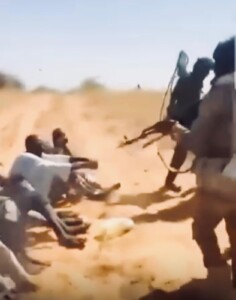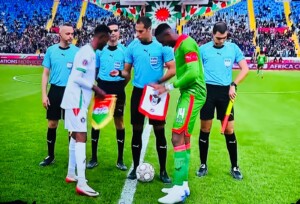Op-ed: Sudan’s new government can’t succeed if it remains on the US blacklist
Washington’s refusal to remove Khartoum from the state sponsors of terrorism list will slow Sudan’s transition to democracy and could undermine it, according to an op-ed by Hala Al Karib and El Sadig Hassan published on December 9 by foreignpolicy.com.
 File photo
File photo
Washington’s refusal to remove Khartoum from the state sponsors of terrorism list will slow Sudan’s transition to democracy and could undermine it, according to an op-ed by Hala Al Karib and El Sadig Hassan published on December 9 by foreignpolicy.com.
Although Sudan’s new prime minister visited Washington last week, and the two countries have agreed to swap ambassadors for the first time in 23 years, Sudan and the United States have a long road to travel before normalizing relations.
Since 1997, the United States has kept Sudan and its former leader, Omar al-Bashir, who has been indicted by the International Criminal Court, on its state sponsors of terrorism list. Bashir did indeed harbour terrorists, including al Qaeda’s Osama bin Laden. Bashir’s regime was also involved in dozens of acts of terrorism, including bombing the US embassies in Tanzania and Kenya in 1998, and attacking the USS Cole in 2000.
Earlier this year, after months of heroic protests in Sudan, in many cases led by women, the Bashir regime was toppled. A civilian administration led by Prime Minister Abdalla Hamdok has been put in place to oversee a transition to democracy by 2022.
But even though Bashir is gone, Sudan remains on the US state sponsors of terrorism list. This will not help pave the way to a new Sudan. The new government is fragile, and the forces ranged against it are powerful. The transition to a democratic government will be difficult enough as it is and much more difficult if Sudan remains on the US terrorist sponsors list.
The transition to a democratic government will be difficult enough as it is and much more difficult if Sudan remains on the US terrorist sponsors list
Last month, the US State Department made it even more difficult for Sudan to overcome this obstacle. It said that Sudan must make progress in six areas before a review of its status can begin: more cooperation on counterterrorism; improved human rights protections, including freedom of religion and the press; increased humanitarian access; ending fighting and conflicts with rebels within Sudan; showing that Sudan has ceased supporting terrorism; and severing ties with North Korea.
Despite the terrorist label, the United States continued to acquire intelligence from Bashir’s regime in exchange for limiting international censure of Khartoum. The prospect of being removed from the state sponsors of terrorism list was an incentive for Bashir’s government to become cooperative, so the US government wants to keep Sudan on the list to maintain that leverage. Better the devil you know, this implies, than the devil you don’t.
When the Obama administration began a policy of more open engagement toward Sudan in 2015 and lifted long-standing economic sanctions as a pretext to discussing the lifting of the terrorist sponsor designation, many in Sudan opposed the policy, believing it only served to strengthen Bashir, who was viewed by the Sudanese people as a criminal, illegitimate leader who had killed, tortured, and displaced millions of Sudanese. Removing Sudan then would have been a bargain with the devil.
But, now, maintaining the terrorist sponsor designation undermines the fledgling government and punishes it for the crimes of its predecessor. Hamdok, meanwhile, is struggling to get out from Sudan’s enormous debt burden and attract trade and investment. At the moment, the economy is in free fall and the prices of basic foods and medicines are rising.
Taking Sudan off the list will allow the new government to seek debt relief and open the door to increased international and regional investment and trade. This is vital to stimulating Sudan’s plummeting economy and to ending years of corruption. Sudan will have the opportunity to engage with the international banking system. Doing so would strengthen the capacity of the new government to tackle corruption and dismantle funding streams for terrorist and criminal networks. Sudan’s citizens should not be punished for the sins of the regime that caused them so much suffering and that they sacrificed so much to remove.
Sudan’s citizens should not be punished for the sins of the regime that caused them so much suffering and that they sacrificed so much to remove
Hamdok has taken a series of encouraging steps that should signal his government’s willingness to be a more responsible member of the international community. He has encouraged organizations banned by the previous regime to return to Sudan and to support United Nations engagement in conflict-affected areas. And Hamdok has included women, human rights activists, and advocates for media and religious freedom in his government. He has announced a law reform commission and demonstrated a serious commitment to the principal of equal citizenship, including freedom of religion and gender equality, while the Ministry of Justice works to address discrimination and inequalities. Perhaps most important, the cabinet is dominated by secular pro-democracy officials.
Hamdok has also created a plan to send internally displaced persons back to their homes and villages. He signed an agreement with the U.N. to provide humanitarian access throughout the country and, earlier this year, the World Food Programme delivered food assistance to the rebel-held area in the Nuba Mountains region for the first time since 2011. The transitional government has also opened all the routes for humanitarian assistance and trade allowing the different communities in the Nuba Mountains to once again engage in their traditional community markets after almost 10 years. Finally, Hamdok has signalled his interest in ending conflicts within Sudan, in Darfur, South Kordofan, and Blue Nile state.
Previously published on foreignpolicy.com on December 9. Reproduced here by express permission of El Sadig Hassan
Disclaimer: The views and opinions expressed in this article are those of the contributing author(s) and do not necessarily reflect the position of Radio Dabanga.
Radio Dabanga’s editorial independence means that we can continue to provide factual updates about political developments to Sudanese and international actors, educate people about how to avoid outbreaks of infectious diseases, and provide a window to the world for those in all corners of Sudan. Support Radio Dabanga for as little as €2.50, the equivalent of a cup of coffee.












 and then
and then